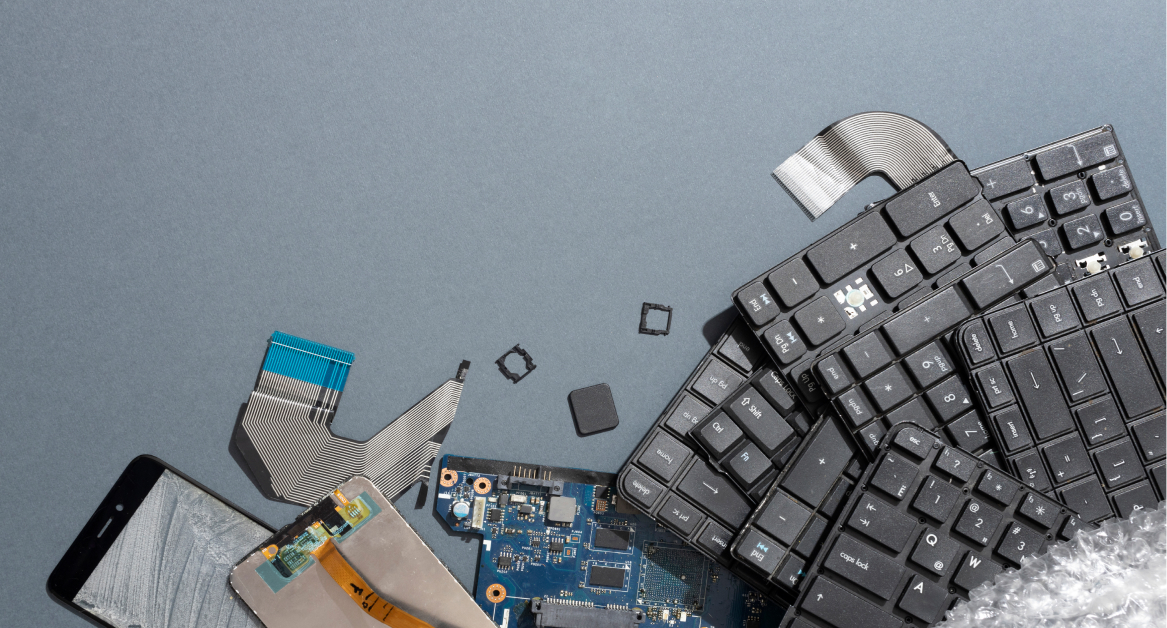When your employees leave, what happens to their laptops? The answer might be unclear if you’re like many growing companies with remote or hybrid teams. Devices sit idle, get lost in transit, or worse — hold onto sensitive data long after offboarding.
That’s where IT disposal services come in. These services help businesses responsibly dispose of electronic devices while protecting company data and minimizing environmental impact. It’s a must-have in today’s world of distributed workforces, tight compliance requirements, and rising e-waste concerns.
In this article, we’ll unpack how IT disposal services work and what to look for in a provider.
What are IT disposal services?
IT disposal services refer to the secure, compliant, and eco-friendly process of decommissioning and discarding outdated or unused electronic devices from your organization. These services are especially critical for startups and companies with hybrid or remote teams, where devices are often distributed across multiple regions.
At their core, IT disposal services aim to achieve three main goals:
- Protect sensitive data through proper data destruction
- Reduce environmental impact by minimizing electronic waste
- Ensure compliance with regional and international regulations
Disposing of devices like laptops, tablets, or phones isn’t as simple as tossing them in the trash. These electronic devices hold valuable data and may contain hazardous components that require careful handling. A reliable IT disposal provider ensures every process step is secure, traceable, and sustainable.
For companies managing remote devices, the challenge multiplies. Devices are often located far from the headquarters, making retrieval and disposal more complex. That’s why many organizations turn to specialized providers who offer services like laptop retrieval service, asset disposal, and waste recycling that are tailored for distributed teams.
Some examples of items covered by IT disposal services include:
- End-of-life laptops and desktops
- Mobile phones and tablets
- Servers and networking hardware
- Peripherals like keyboards, monitors, and printers
These services typically fall under a broader category known as IT asset disposition, or ITAD. By integrating ITAD into your IT processes, you can streamline offboarding, protect your company’s data, and support your sustainability goals.
Key features of a compliant IT disposal service
For businesses — especially those with remote or hybrid teams — it’s critical to choose a provider that meets both security and environmental standards. A compliant service does more than haul away old laptops. It ensures every step is traceable, secure, and environmentally responsible.
Here are the key features to look for:
1. Certified data destruction
Before a device is discarded or reused, all data must be completely and irreversibly destroyed. A good provider uses certified methods like data wiping, degaussing, or physical destruction to prevent any chance of data recovery. This is especially important if the devices contain customer information, financial records, or internal communications.
2. Secure asset tracking
From the moment a device leaves your employee’s hands to its final disposal, you should have a full audit trail. This includes serial numbers, timestamps, and chain-of-custody documentation. Proper asset tracking also supports compliance efforts and internal IT audits.
3. Support for remote device retrieval
With more companies supporting hybrid and remote work, a laptop retrieval service is essential. Whether an employee leaves the company or upgrades are due, your IT partner should manage device pickup and transport — even from home addresses — without friction.
4. Environmentally responsible waste recycling
Look for providers that emphasize disposal and recycling over landfill dumping. That includes proper separation of materials, working with certified recycling services, and adhering to e-waste handling laws. Reducing electronic waste is not just good for the planet — it’s also good PR and increasingly important to investors.
5. Global coverage with local compliance
For companies operating in multiple countries, IT disposal services must comply with various regional laws. A trustworthy provider will know how to navigate this and ensure that your electronic devices are handled in accordance with local environmental and data protection standards.
6. Device lifecycle management integration
A compliant provider doesn’t just handle disposal — it fits into your broader device lifecycle management strategy. From procurement to decommissioning, they help you optimize usage, reduce costs, and simplify processes.
Common mistakes to avoid

1. Throwing devices in the trash
Disposing of electronic devices with regular office waste is not only irresponsible — in many countries, it’s illegal. These devices often contain harmful materials like lead, mercury, and lithium, which can leak into the environment. Instead, work with a provider that prioritizes waste disposal through proper recycling services.
2. Skipping data destruction
Don’t assume deleting files or performing a factory reset is enough. Without certified data destruction, sensitive company information may still be recoverable. This is a serious risk, especially for regulated industries or companies managing customer data.
3. Holding onto unused devices
It’s tempting to stash old laptops “just in case.” But unused equipment quickly becomes outdated, loses value, and poses a security risk if it’s not tracked. Having a clear asset disposal plan ensures you’re not sitting on a pile of hidden liabilities.
4. Failing to retrieve remote devices
Remote and hybrid teams have made laptop retrieval service more complex. Some companies rely on employees to ship devices back — but packages go missing, devices get damaged, or never return at all. A proactive retrieval process helps avoid these issues and closes the loop on the device lifecycle.
5. Choosing non-compliant vendors
Not all providers meet security or environmental standards. If a vendor can’t prove where your devices go or how your data is destroyed, they’re not a safe partner. Always ask for certifications, audit logs, and documentation.
6. Overlooking reporting and documentation
Proper IT disposal includes documentation for internal audits and compliance reporting. If you’re ever asked, “What happened to that device?” you should have the answer ready — with full records from collection to disposal and recycling.
Avoiding these mistakes protects your business, your data, and your brand reputation. It also positions you as a responsible player in the era of electronic waste and sustainability.
Choosing the right IT disposal services provider
Here’s what to look for when evaluating IT disposal service providers:
1. Security-first approach
Start with security. Your provider should offer certified data destruction services, including wiping, degaussing, or physical shredding of drives. Ask for documentation and certifications that prove compliance with standards like NIST, DoD, or ISO 27001.
2. Experience with remote and distributed teams
Not every vendor understands the complexities of supporting remote workforces. Look for one that offers laptop retrieval services and understands how to manage pickups from employee homes across different cities or countries. This is especially important for startups and scaleups with hybrid teams.
3. Full-service device lifecycle support
Your ideal provider won’t just show up when it’s time to discard devices. They should support the full device lifecycle management process — from procurement and deployment to disposal and recycling. This helps streamline operations and reduce overall IT costs.
4. Transparent reporting and tracking
Accountability matters. A reputable provider will offer clear reporting on every asset: when it was collected, how it was handled, and how it was ultimately disposed of or recycled. This is crucial for internal audits and demonstrating compliance with data privacy or environmental laws.
5. Commitment to sustainability
A forward-thinking provider focuses on recycling service and waste recycling, not landfills. Ask whether they partner with certified electronic waste facilities and how they ensure sustainable practices. Some providers also offer programs to refurbish and donate usable devices — a win-win for both business and the environment.
6. Scalability and regional coverage
Your needs may grow fast. Choose a partner with the infrastructure to scale alongside you. Whether you’re operating in one country or ten, they should be able to support your asset disposal needs wherever your team is.
The role of IT asset disposition (ITAD) providers
If you’ve ever wondered who handles the behind-the-scenes process of securely and sustainably discarding old devices, the answer is simple: IT asset disposition providers, or ITAD providers.
ITAD providers specialize in managing the end-of-life stage of your hardware — from secure collection and data destruction to disposal and recycling. But their role goes beyond simply getting rid of equipment. A great ITAD partner becomes a critical part of your IT strategy, helping you reduce risk, reclaim value, and stay compliant.
Here’s what they bring to the table:
1. Structured and secure decommissioning
ITAD providers ensure that your decommissioning process follows a set protocol. They offer secure pickup or shipping options, track each asset through the chain of custody, and guarantee that every piece of hardware — from laptops to servers — is handled with care.
2. Environmental compliance and certifications
These providers are experts in waste disposal laws, electronic waste regulations, and recycling standards. They ensure that your electronic devices are processed according to local and international environmental guidelines. Many ITAD vendors also carry R2 or e-Stewards certifications, ensuring a higher level of environmental responsibility.
3. Maximizing asset value
Believe it or not, some end-of-life devices still have residual value. ITAD providers can help refurbish and resell usable equipment, returning some of that value to your company. They also offer recycling services for components that can’t be reused, helping reduce landfill contributions.
4. Global logistics and remote retrieval
For distributed teams, logistics can be a challenge. A capable ITAD provider offers reliable laptop retrieval service, no matter where your employees are located. This ensures consistency in your offboarding and device lifecycle management processes.
5. Documentation and audit trails
ITAD providers supply detailed reports and certificates of destruction. This paperwork is not only helpful — it’s often necessary to demonstrate compliance with data privacy regulations, environmental policies, or internal audits.
Simplify your IT disposal process with confidence
Outdated devices shouldn’t become a liability. A trusted IT disposal service helps your business stay secure, compliant, and environmentally responsible — especially when your workforce is spread across cities or countries.
Instead of juggling multiple vendors or worrying about forgotten laptops, you can rely on a single partner to handle it all — from pickup to certified destruction to responsible recycling.
Esevel makes IT asset disposal easy for remote and hybrid teams worldwide. Our platform blends automation with expert support to help you manage every stage of the device lifecycle — securely, seamlessly, and at scale.







